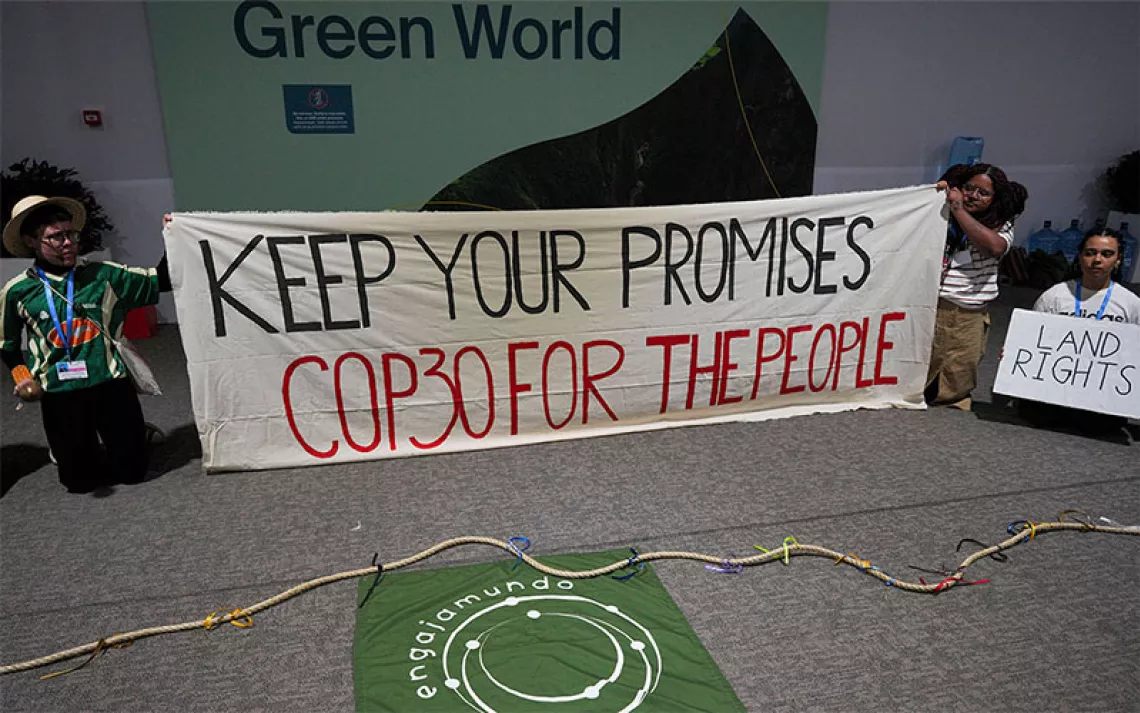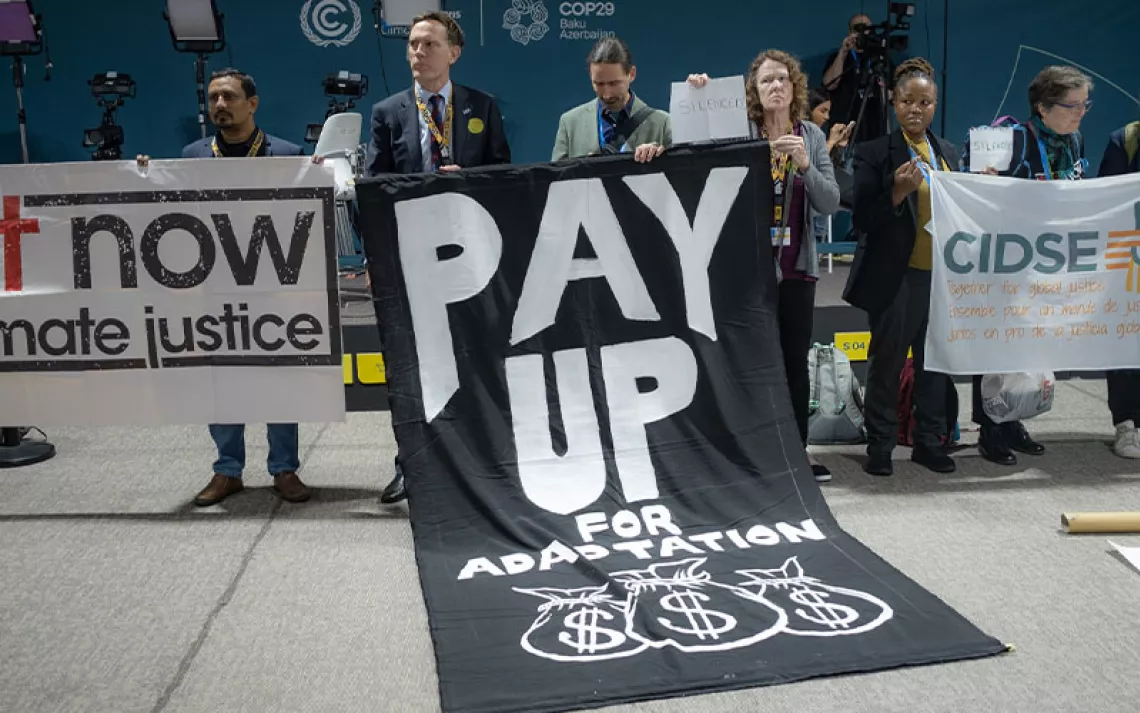The Most Worrisome Threat to Global Climate Action You’ve Likely Never Heard Of
How investor-friendly trade agreements might squelch government efforts to halt oil and gas expansion

Photo by iStock/erhui1979
When governments around the world finally get serious about addressing the climate crisis, they will inevitably need to begin restricting oil and gas production. As the International Energy Agency concluded last year, any further expansion of the fossil fuel is incompatible with reaching net-zero greenhouse gas emissions by mid-century. But when governments do finally take that warning seriously and begin to put tougher restrictions on new fossil fuel projects, they may confront an often-overlooked obstacle: Obscure trade agreements and treaties that could allow the fossil fuel industry and its investors to file legal claims to win hundreds of billions of dollars in compensation from cash-strapped governments.
A new study published in Science estimates that governments could be on the hook for $340 billion in legal claims, a sum so large that it could cripple the finances of developing countries that take climate action at a time when it is desperately needed. Worryingly, the mere threat of legal claims could dramatically slow the clean energy transition by encouraging fossil fuel investments for many more years, according to the study.
“In terms of talking about a just transition, the finance should be flowing from the Global North to the Global South to help them transition,” Kyla Tienhaara, Canada Research Chair in economy and environment at Ontario-based Queen’s University and one of the authors of the new study, told Sierra. “And instead, what could be happening is that if [countries] take the action that is necessary to address climate change, finance could be flowing from [governments in the Global South] to companies that are based in the Global North. That's the part of the story for me that is most concerning.”
How could this possibly happen? At issue are what are known as investor-state dispute settlement (ISDS) systems, which are basically a way for corporations to sue national governments over alleged infringement of so-called “free trade” rules. In recent decades, investor-state dispute settlement provisions have proliferated via trade regimes like the North American Free Trade Agreement (NAFTA). Today, ISDS systems are a ubiquitous, almost unavoidable part of international relations, since they have been written into more than 3,000 investment treaties and trade agreements.
In recent years, free-trade-regime legal claims against governments have exploded. Fewer than 50 cases were filed in the first three decades of the ISDS system. In the past decade, global corporations filed more than 50 cases each year, according to Public Citizen.
ISDS goes far beyond their original intent of protecting investors from having their assets expropriated. Critics of these supra-national courts have long said the investor-state dispute systems stack the deck in favor of multinational corporations and elevate corporate rights over national sovereignty, while undermining much needed protections for health and the environment.
“The rights themselves are defined so broadly. It's not just direct expropriation, but ‘indirect expropriation,’” Melinda St. Louis, director of Public Citizen’s Global Trade Watch, told Sierra. That definition could encompass basically any government action that impacts the profits of an investment from a foreign company. Companies can not only file for compensation if their profits are actually affected, but they can also seek damages for their potentially lost future profits.
The ISDS process itself is “inherently undemocratic,” St. Louis added. Cases are decided by three-member international tribunals that exist outside of national court systems. The members of these tribunals are paid by the volume of cases, and often have a conflict of interest because they come from the corporate world. The arbitrators can even preside over a case in one instance, and represent a corporation on a similar matter in another case. And while companies can sue governments, governments can’t sue companies.
And if this whole thing sounds a bit neo-colonial, that’s because it is. ISDS originated in the post-World War II era when colonial empires began to disintegrate and newly independent states asserted control over their territories and natural resources. ISDS proponents first billed the concept as a way of ensuring some protection for investors in risky places, and as a way for developing countries to attract foreign investment. If a government expropriated a factory or an oil field, the aggrieved company could go to an international tribunal and seek compensation. Critics, however, saw it as a way for imperial powers to maintain economic control over their former colonial dependencies.
There is a long list of cases in recent decades in which extractive industries have used these “investor rights” to win compensation from governments that try to put in place environmental and health protections. For instance, in 1997, Metalclad Corporation, a US-based waste management company, filed an ISDS case against Mexico after its permit to expand a toxic waste dump was denied by the small Mexican town of Guadalcazar. The municipality was concerned about environmental contamination and health hazards to the local population and had already denied a permit for a similar facility to a Mexican company. Metalclad said the rejection amounted to “expropriation.” A dispute tribunal, under the auspices of NAFTA, ordered Mexico to pay Metalclad more than $16 million.
In another case, the Colombia government enacted laws in 2010 to protect a fragile high-altitude ecosystem known as the páramo from mining projects. In the following years, tens of thousands of Colombians protested because loopholes in the laws kept alive a proposed large-scale gold mine by a Canadian company called Eco Oro. In 2016, a court decision closed those loopholes, a victory for Colombians opposing the mine. But Eco Oro turned to an international tribunal to demand compensation, a tool it had at its disposal because of a Canadian-Colombian investment treaty. The tribunal ruled in the company’s favor in 2021, with the specific compensation yet to be determined.
Corporations routinely use the ISDS system to rake in millions of dollars, even for projects that are in their earliest stages. Public Citizen has called the ISDS architecture a “rigged” system that “allows multinational firms to skirt national court systems and privately enforce their extraordinary privileges by directly challenging national governments before extrajudicial tribunals.”
Investor rights could prevent climate action
Fossil fuel investments are particularly ripe for international legal conflict because they are precisely the kind of dangerous industry that governments would want to regulate.
“When the people want to protect the environment, and your business is to destroy the environment, then that is going to affect the amount that you expected to earn,” St. Louis said. “That's why it's so outrageous when you look at these individual cases.”
In the midst of a climate emergency, the investor-biased system threatens catastrophe. If a country wants to shut down an oil pipeline in the name of fighting climate change, a multinational company could easily turn to international tribunals for a massive payoff.
This isn’t a theoretical concern. When the Netherlands decided to phase out coal-fired electricity, two German companies, RWE and Uniper, filed cases against the Dutch government in 2021, seeking billions of euros in compensation. Last year, the Italian government decided to ban offshore oil drilling in the Adriatic Sea, and UK-based oil company Rockhopper sued, claiming the ban would prevent it from earning an estimated $275 million in future profits. In another case, the government of Slovenia ordered an environmental impact study of a fracking project within its borders. In response, UK-based oil company Ascent Resources sued, calling the action “arbitrary and unreasonable.” All three of those cases are pending, and a decision in the Rockhopper case is expected soon.
Despite these relatively high-profile cases in the industrialized world, many more are investor-to-state complaints are brought against developing countries, which have fewer resources to defend themselves. According to the Science study, if countries align themselves with net-zero emissions pathways by 2050, the five countries with the greatest potential liabilities from ISDS cases include Mozambique, which could see $7 billion to $31 billion in losses, followed by Guyana ($5–21 billion), Venezuela ($3–21 billion), and Russia ($2–16 billion). The UK comes in fifth with $3-14 billion in potential liabilities, underscoring the fact that rich countries are not immune from ISDS.
Together, the total losses to governments that eventually limit fossil fuel production could reach $340 billion as the world seeks to keep warming to 2.7 degrees Fahrenheit of warming (or 1.5 degrees Celsius). Tienhaara, one of the authors of the study, said that figure likely understates the true liability.
“ISDS is currently a sizable stick in the hands of polluters eager to protect their profits. Unchecked, it could allow fossil fuel companies to challenge state action that accelerates the needed phaseout of oil, gas, and coal,” Nikki Reisch, climate and energy director at the Center for International Environmental Law, told Sierra in an email. “States created this system, and states can dismantle it.”
Just the threat alone of a legal claim could scare away countries from pursuing climate policy. “One is the liability of the cases themselves. And then the other is just the threat of these cases can have a chilling effect on policies,” St. Louis said. “If you look at a government, especially in developing countries, this is just one more big tool that multinational companies can use to bully governments.”
In its most recent report, the International Panel on Climate Change (IPCC) specifically called out investor protections as a big hurdle to global climate action. “While international investment agreements hold potential to increase low-carbon investment in host countries, these agreements have tended to protect investor rights, constraining the latitude of host countries in adopting environmental policies. Moreover, international investment agreements may lead to ‘regulatory chill’, which may lead to countries refraining from or delaying the adoption of mitigation policies, such as phasing out fossil fuels,” the IPCC report said.
The ability to take away tools from governments to act in the public interest has always been part of the design of investor-state dispute systems. “It's a huge scandal. But it's also unsurprising because the whole idea comes from countries in the Global North that basically thought out these agreements, also partially in direct coordination with national fossil fuel companies,” Cornelia Maarfield, a senior trade and investment policy coordinator for Climate Action Network Europe, told Sierra. Officials from Shell had a hand in the earliest designs of ISDS in the 1950s.
“ISDS has to go,” Maarfield said. “Investor rights need to be curtailed. And there needs to be some obligations from companies. States basically have to sit down and recognize that we are in a climate emergency. There is an architecture of trade and investment agreements here that is really preventing us from achieving our climate objectives.”
The good news is that some national leaders are beginning to resist the ISDS systems. “Given the greed of corporations, that they just couldn't help themselves from taking it to such a degree that I think now finally there is a big push back,” St. Louis said.
South Africa is scrapping ISDS in its investment treaties. And some European governments are rethinking the Energy Charter Treaty (ECT), an investment treaty setup in the early 1990s after the fall of the Soviet Union, mainly for European companies to invest in the former Soviet bloc. The members of the ECT are currently negotiating reforms to the existing treaty, although it is unclear how far they will go to roll back some of the investor protections standing in the way of climate action.
The United States has not typically been on the receiving end of ISDS cases, but after President Biden cancelled the Keystone XL pipeline at the beginning of his presidency, TC Energy filed a claim seeking $15 billion in compensation, citing investor protections in NAFTA. The Biden administration has vowed to oppose ISDS in future trade agreements.
Opposition now spans the political spectrum. Republicans, skeptical of international bodies constraining US sovereignty, have soured on ISDS. Former President Trump’s rewrite of NAFTA excluded ISDS provisions—though, tellingly, maintained a special exemption for oil and gas companies investing in Mexico.
“Momentum is definitely … against these agreements,” St. Louis said. “They've become politically toxic, particularly in the United States. The problem is these legacy agreements are still there,” St. Louis said.
Tienhaara said that governments should terminate investment treaties that contain ISDS. Short of that, they should pursue drastic reforms. She also said that countries should end oil and gas exploration, which only adds more vulnerabilities with climate policy inevitably coming down the pike. “If you don’t stop exploration immediately, you’re just increasing your future liability,” Tienhaara said. “The reality is these projects eventually have to get shut off. That’s just undeniable.”
More broadly, the problems with ISDS present two core questions. “First, do we think that fossil fuel companies should be compensated for their losses in their transition?” Tienhaara said. “My position would be informed by the fact that they have obstructed climate policy and that they have tried everything to keep their business model going. And they’ve profited massively. So, I don’t think they should be compensated.”
She went on. “But the second question is, regardless of your answer to the first question, who do you think should get to decide what compensation they receive during the transition? I think it should be a democratic process,” she said. “But you're not going to get that if it's decided in arbitral tribunal. So, it is a democracy question, really.”
 The Magazine of The Sierra Club
The Magazine of The Sierra Club



